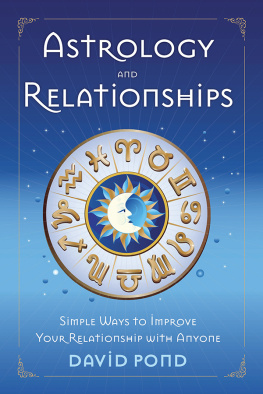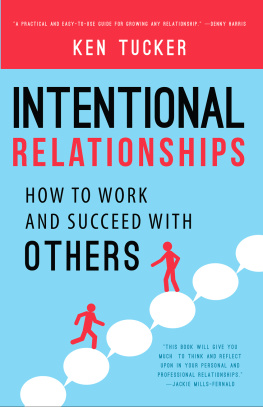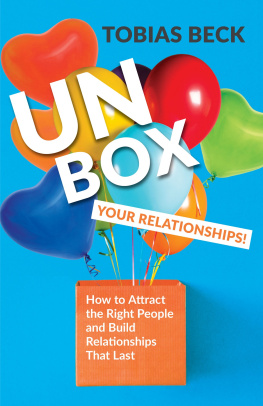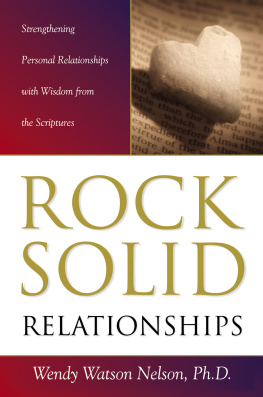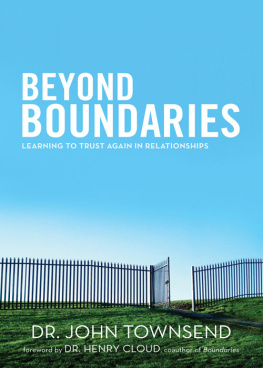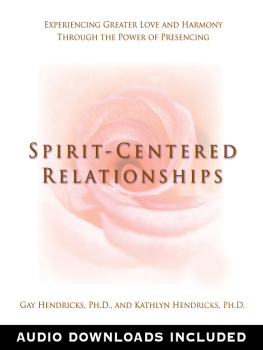
Relationships
A Mess Worth Making
Timothy S. Lane and Paul David Tripp
New Growth Press
www.newgrowthpress.com
2006, 2008 by Timothy S. Lane and Paul David Tripp
All rights reserved. No part of this book may be reproduced, stored in a retrieval system or transmitted in any form or by any meanselectronic, mechanical, photocopy, recording, or otherwiseexcept for brief quotations for the purpose of review or comment, without the prior permission of the publisher, New Growth Press, P.O. Box 9805, Greensboro, NC 27429-0805.
All Scripture quotations, unless otherwise indicated, are taken from the Holy Bible, New International Version. NIV. Copyright 1973, 1978, 1984 by International Bible Society. Used by permission of Zondervan. All rights reserved.
Cover Design: Matt Nowicki
ISBN-10: 0-9770807-6-5
ISBN-13: 978-0-9770807-6-2
Religion/ Christian Life/ Relationships
To our wives, Barbara and Luella
Acknowledgments
When someone writes a book, the readers assumption is that the author is an expert on the subject. Let us say unequivocally that our readers should not make that assumption about us! This is especially true when one writes on relationships. There is nothing more complex and challenging in life. In the first chapter, we talk about our own struggle to love others well, including each other. We first wrote that section as a brief introduction. But upon reflection, we thought it should be in the body of the book. We did not want people to forget that we too are sinners, daily dependent on Gods grace to do what we encourage others to do.
Yet the acknowledgment of struggle and failure should not overshadow the hopeful truth that in Christ relationships can be maintained and repaired. They can flourish! They can become deeper and more meaningful than they were before they were ruptured by sin. We hope that both aspects of relationships come through in this book. Relationships are messy; they are also what God uses to rescue us from ourselves. Through them, God shows us our inability to love others without first finding our strength in our relationship with the God who created and redeemed us.
In light of this, we want to thank the people who have taught us the most about our need for Gods grace. First, thanks to the families in which we grew up, our parents and siblings who have taught us so much. Second, thanks to our wives and children, who continue to watch us struggle and grow as husbands and fathers. Third, we are grateful to the churches and ministries we have served; they have helped us apply what we write about. Fourth, we thank the staff and faculty of CCEF, who have challenged us and encouraged us along the way. And finally, thanks to the churches where we are currently involved. Growth in grace is certainly a community project!
Once again, we are very grateful for the editorial work of Sue Lutz and her staff. This book has been much improved by her keen oversight and skill. The editing process itself has been a place to grow in our relationships with one another. For that, we can all be thankful.
As you read this book, we hope you will see that we dont need new or sophisticated techniques to see relationships flourish. It all boils down to basic character qualities that can only be formed in the heart by the gospel. This is how relationships grow and communities form to reflect Gods glory and grace. We hope this book will move you down that path in significant ways. Writing it has done that for us.
Timothy S. Lane and Paul David Tripp
June 5, 2006
Chapter 1
The Shortest and Most Important Chapter of This Book
Writing a book is always a journey of unexpected turns. Try as you may to chart your course, you never wind up exactly where youve planned. This chapter is one of those unexpected turns. As we finished writing this book, we realized that we should explain to you how it was written. What you are about to read is a book on relationship that was written in relationship. When we coauthored How People Change, we divided up the chapters and wrote separately. However, we decided to write this book together. We worked at Tims houseTim at the computer and Paul pacing back and forth across the room. We discussed our way through sentences, paragraphs, pages, and chapters. When we finished, we both agreed that this process was one of the most unique and enjoyable ministry experiences of our lives.
What resulted from our collaboration is not just an examination, but an actual example of broken people in broken community experiencing the reconciling grace of God. We have written as flawed people in close relationship who have experienced Gods grace in daily life and ministry. We have not written out of the wisdom of success, but out of the wisdom of striving. A brief history of our relationship will illustrate this point.
About five years ago, Paul was working at the Christian Counseling & Educational Foundation leading the department for local church-based training. The faculty of CCEF came to see that this job was too big for one person and decided to hire a seasoned pastor to partner with Paul. It was decided that Tim was just the kind of man to fill this role. The two of us began our work with excitement and mutual appreciation. However, problems arose when we, as two leaders who had known each other only from a safe distance, began working together in the same room! It became apparent that, although we shared a vision, we had very different personalities and gifts. It didnt take long for sin, weakness, and failure to rear their ugly heads. Minor offenses and major misunderstandings began to get in the way of our mutual appreciationand the work God had brought us together to do.
This was a crucial moment. Would we give in to disillusionment and discouragement, or would we commit ourselves to do what we regularly teach others to do? We decided that our only choice was to trust Christ the way we ask others to, and give him an opportunity to work in us so that he could work through us.
We are quick to say that we are not heroes of relationship. In fact, the opposite is true. Our aim is that this book will help you look through the shattered glass of our sin to see the glory of a Redeemer who is ever-present, always at work to rescue and change us. We want you to know that the men who wrote this book are just like you in both struggle and potential. We are sinners with the capacity to do great damage to ourselves and our relationships. We need Gods grace to save us from ourselves. But we are also Gods children, which means that we have great hope and potentialnot hope that rests on our gifts, experience, or track record, but hope that rests in Christ. Because he is in us and we are in him, it is right to say that our potential is Christ!
We are well aware that we are smack-dab in the middle of Gods process of sanctification. And because this is true, we will struggle again. Selfishness, pride, an unforgiving spirit, irritation, and impatience will certainly return. But we are neither afraid nor hopeless. We have experienced what God can do in the middle of the mess. This side of heaven, relationships and ministry are always shaped in the forge of struggle. None of us get to relate to perfect people or avoid the effects of the fall on the work we attempt to do. Yet, amid the mess, we find the highest joys of relationship and ministry.
We want to affirm to you that what you will find in this book is true. We know it is true not only because we have examined the books theology and found it to be orthodox, but also because we have tested the books God and found him to be faithful again and again. What the book has to offer is not the wisdom of two men who have arrived, but the worship of two needy men who want to point you to the unfathomable and accessible resources of the God who has been with us and is with you. He is near, with, and in you. This means there is hope for you, even in relationships that leave you confused and disappointed.
Next page

